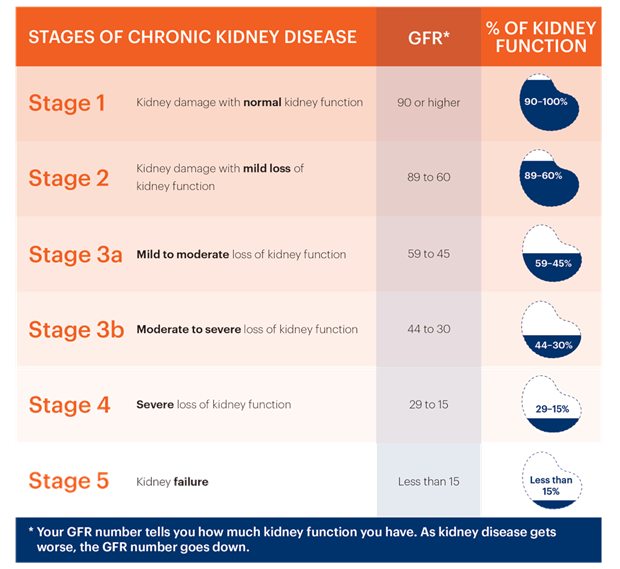In replying to a client's questions about the seriousness of the chronic kidney disease (CKD), the nurse knows that the stage of CKD is based on what?
Serum creatinine and urea levels.
Degree of altered mental status.
Glomerular filtration rate (GFR).
Total daily urine output.
The Correct Answer is C
The glomerular filtration rate is a measure of how effectively the kidneys filter waste and excess fluid from the blood. It is a key indicator of kidney function. CKD is staged based on the GFR, which provides an estimate of the percentage of normal kidney function remaining.
While serum creatinine and urea levels are important markers used to assess kidney function, they are not the sole criteria for staging CKD. The degree of altered mental status and total daily urine output are important clinical observations but are not used for staging CKD.

Nursing Test Bank
Naxlex Comprehensive Predictor Exams
Related Questions
Correct Answer is A
Explanation
Recombinant human erythropoietin is a medication commonly used in the treatment of anemia associated with chronic renal failure. It stimulates the production of red blood cells in the bone marrow, helping to improve anemia.
The other statements mentioned do not accurately reflect the expected outcomes or effects of recombinant human erythropoietin:
Chronic renal failure leads to impaired kidney function, and while recombinant human erythropoietin can help address anemia, it does not directly improve creatinine (Cr) and blood urea nitrogen (BUN) levels, which are markers of kidney function.
Furosemide is a diuretic commonly used in the management of fluid retention in renal failure. Recombinant human erythropoietin does not replace or eliminate the need for diuretic therapy.
Chronic renal failure typically involves decreased kidney function and impaired urine production. Recombinant human erythropoietin does not directly affect urine output.
Correct Answer is B
Explanation
A blood glucose level of 40 mg/dL indicates severe hypoglycemia, which is a medical emergency requiring immediate attention. Hypoglycemia can lead to confusion, altered mental status, seizures, and loss of consciousness if not treated promptly. Therefore, it is crucial to assess and intervene quickly to raise the patient's blood glucose level to a safe range.
While the other clients mentioned also require attention and appropriate care, the severity and immediate risk associated with severe hypoglycemia make it the priority situation. The nurse should initiate appropriate treatment for hypoglycemia, such as administering glucose or glucagon, and closely monitor the patient's response.
Whether you are a student looking to ace your exams or a practicing nurse seeking to enhance your expertise , our nursing education contents will empower you with the confidence and competence to make a difference in the lives of patients and become a respected leader in the healthcare field.
Visit Naxlex, invest in your future and unlock endless possibilities with our unparalleled nursing education contents today
Report Wrong Answer on the Current Question
Do you disagree with the answer? If yes, what is your expected answer? Explain.
Kindly be descriptive with the issue you are facing.
